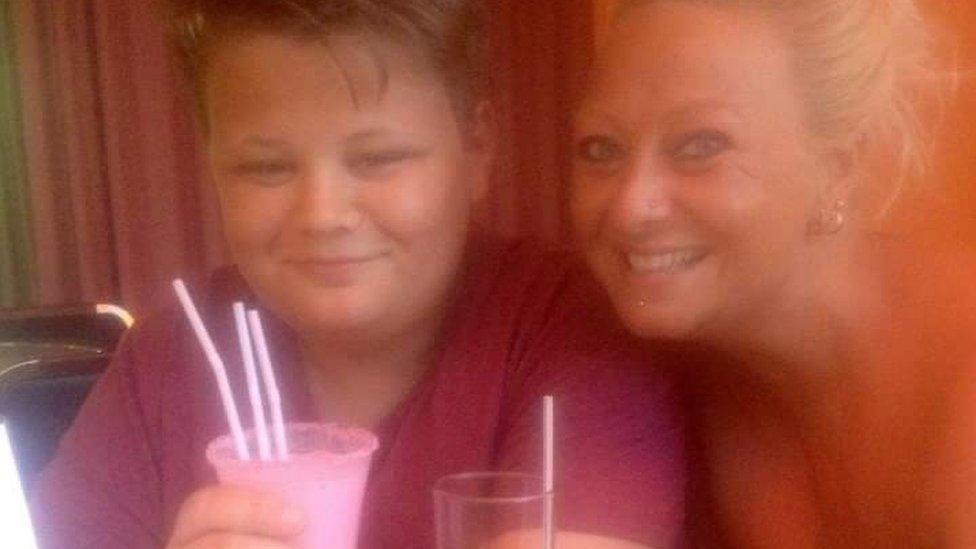Harry Dunn crash: Donald Trump notes say US suspect 'will not return to UK'
- Published
Mr Trump called Harry Dunn's death a "terrible accident"
A woman at the centre of a row over diplomatic immunity will not return to the UK, according to briefing notes held by US President Donald Trump.
Anne Sacoolas is suspected of being involved in a car crash that killed British motorcyclist Harry Dunn, who died in Northamptonshire on 27 August.
Mrs Sacoolas later left the UK to return home to the US, after telling local police she had no such plans.
The note was photographed as Mr Trump addressed reporters at the White House.
It reads: "(If raised) Note, as Secretary Pompeo told Foreign Secretary Raab, that the spouse of the US government employee will not return to the United Kingdom."
Mr Dunn's mother Charlotte Charles said the US's apparent approach was "beyond any realm of human thinking".
Allow X content?
This article contains content provided by X. We ask for your permission before anything is loaded, as they may be using cookies and other technologies. You may want to read X’s cookie policy, external and privacy policy, external before accepting. To view this content choose ‘accept and continue’.
Speaking to Sky News about the photograph of the notes, Mrs Charles said: "I'm just disgusted.
"I don't see the point in Boris Johnson talking to President Trump, or President Trump even taking a call from Boris Johnson.
"If he'd already made his decision that if it were to be asked and if it were to be raised, the answer was already going to be no."
Downing Street confirmed Mr Johnson had urged the US president to reconsider the decision to grant immunity to Mrs Sacoolas.
At the press briefing, Mr Trump called Mr Dunn's death a "terrible accident" and confirmed his administration would seek to speak to Mrs Sacoolas.
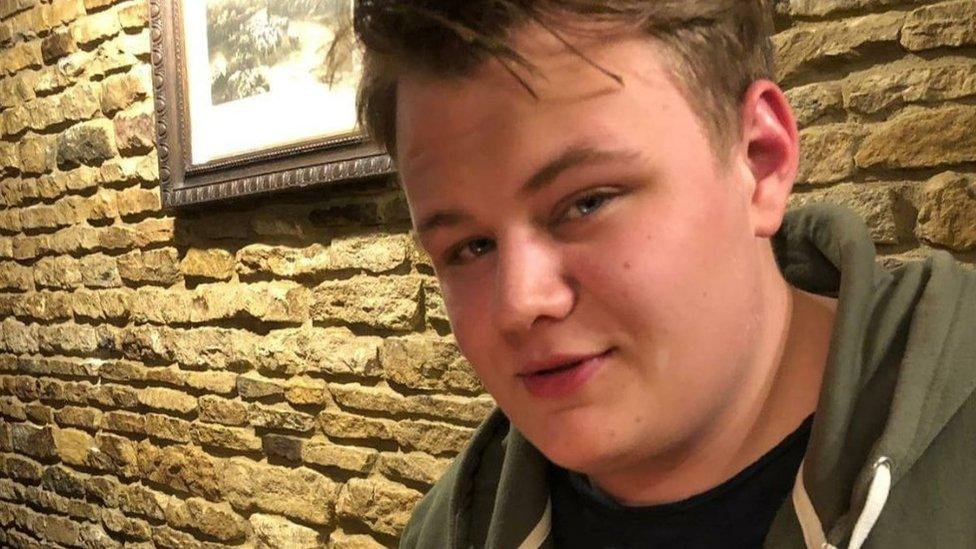
Harry Dunn died in hospital after his motorbike was in a crash with a Volvo
Police have said CCTV of the crash in which the teenager died shows a Volvo travelling on the wrong side of the road.
Speaking at the press briefing on Wednesday evening - after his conversation with the prime minister - Mr Trump said: "The woman was driving on the wrong side of the road, and that can happen.
"You know, those are the opposite roads, that happens. I won't say it ever happened to me, but it did.
"So a young man was killed, the person that was driving the automobile has diplomatic immunity, we're going to speak to her very shortly and see if we can do something where they meet."

What is diplomatic immunity?
About 23,000 individuals in the UK have diplomatic immunity, a status reserved for foreign diplomats and their families, as long as they don't have British citizenship.
It means that, in theory, they cannot face court proceedings for any crime or civil case.
However, where crimes are committed, the Foreign Office can ask a foreign government to waive immunity.
Diplomatic immunity is by no means restricted to those named on the Diplomatic List. Drivers, cooks and other support staff who have been accredited to Britain ("the receiving state") have the same diplomatic status and immunity.

Speaking in Northampton, Labour leader Jeremy Corbyn said the use of diplomatic immunity in the case was "completely unacceptable".
He said: "We would put every possible bit of pressure we could on the United States and if we could mount legal action on the United States, we would do so."
The crash in which Mr Dunn died happened close to RAF Croughton, a US Air Force communications station, where Mrs Sacoolas's husband Jonathan worked.
Northamptonshire Police Chief Constable Nick Adderley said, "based on CCTV evidence", officers knew "a vehicle alighted from the RAF base at Croughton" and was "on the wrong side of the road".
Mr Dunn's parents are planning to travel to Washington DC as soon as possible.
Shadow foreign secretary Emily Thornberry said the UK was "getting the brush-off" from the US as a result of "cuddling up" to Mr Trump.
Speaking on the Victoria Derbyshire programme, Ms Thornberry said the UK had been "holding his hand... and being a Trump tribute act", which flattered the president who is "only interested in himself".
She said although it was "very unusual" for the prime minister to ask for assistance from the president, Britain needed to "hold its head a bit higher and look Donald Trump in the eye and be clear about what it is we want".

Analysis
By James Robbins, BBC Diplomatic Correspondent
The speaking note which the president held in his hand seems to be confirmation the United States simply will not agree to the return of Anne Sacoolas to the UK.
Whatever the rights and wrongs of their case, that has always been and seems likely to remain the American position. Why?
Washington has a whole raft of unstated motives. They simply don't want the spouse of this particular "US government employee" exposed to questioning, particularly, but not exclusively, because of the likely nature of his work in super-secret military communications routed through RAF Croughton.
More broadly, the Americans are determined not to encourage any country to believe they will succeed in requesting a waiver of diplomatic immunity. After all, if we don't do it for our first among allies, the UK, what chance has any other country got.
And, most broadly of all, America's idea of its own "exceptionalism" means it hates the idea of offering up any citizen for trial in a foreign court - that is, by anyone other than fellow Americans.

Dunn family on Raab meeting: "We feel let down"
Number 10 said the prime minister had urged Mr Trump to reconsider the decision to allow Mrs Sacoolas immunity in order that "the individual involved can return to the UK, co-operate with police and allow Harry's family to receive justice".
The teenager's parents have described a meeting with Foreign Secretary Dominic Raab on Wednesday as a "publicity stunt".
Mrs Charles said she felt "let down" by both the UK and US governments, while Mr Dunn's father Tim Dunn said: "I'm deeply, deeply disappointed that they think it's OK to kill a young lad on his bike and they can just walk away."
Following the meeting, Mr Raab said the justice process was "not being allowed to properly run its course".
- Published9 October 2019
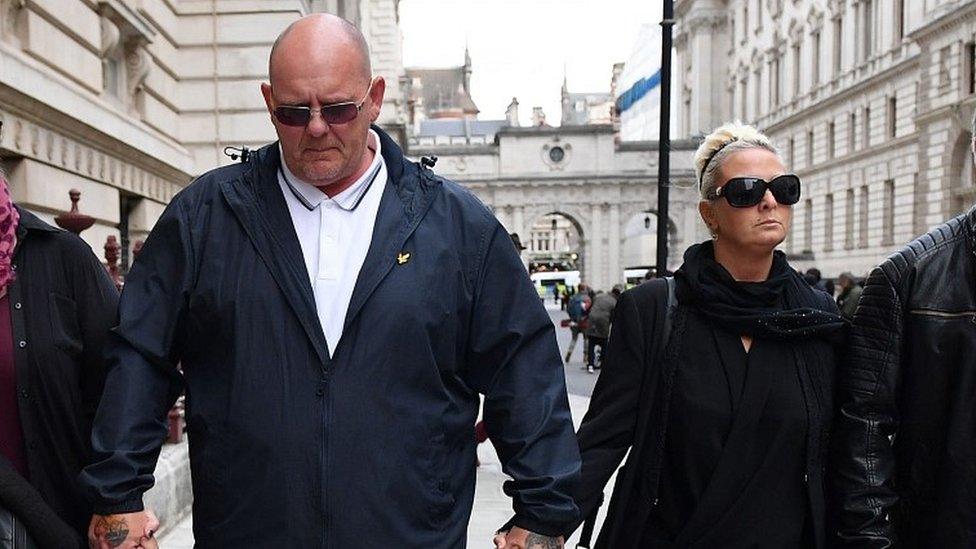
- Published10 June 2024

- Published8 October 2019
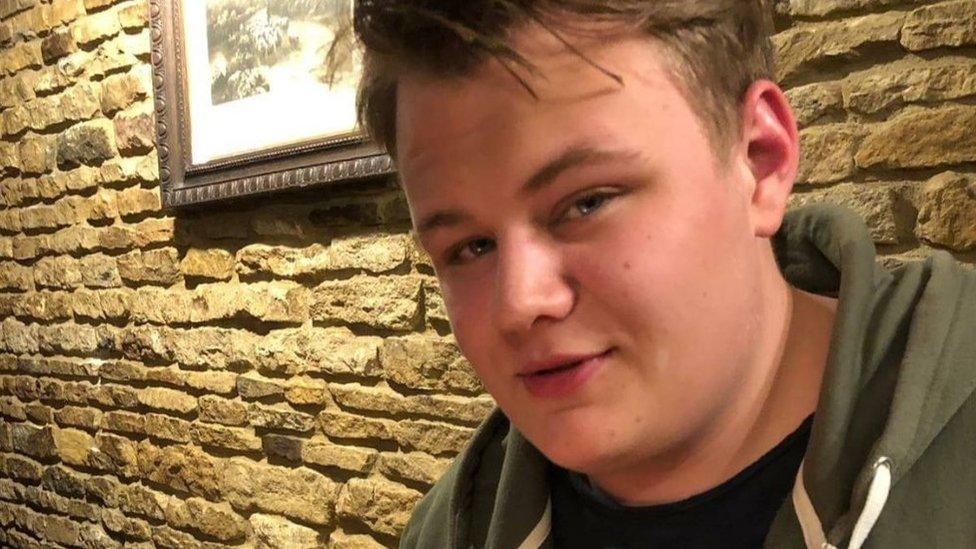
- Published7 October 2019
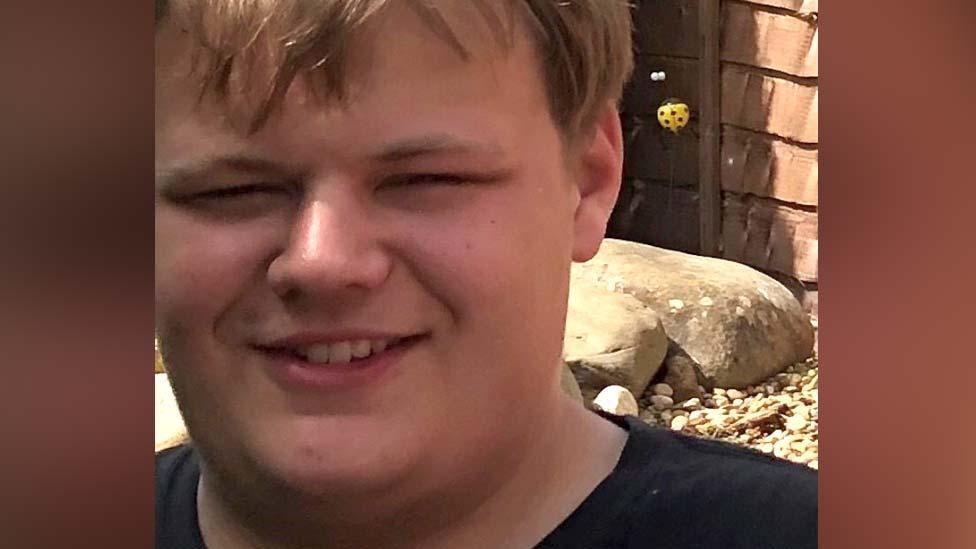
- Published7 October 2019

- Published7 October 2019
